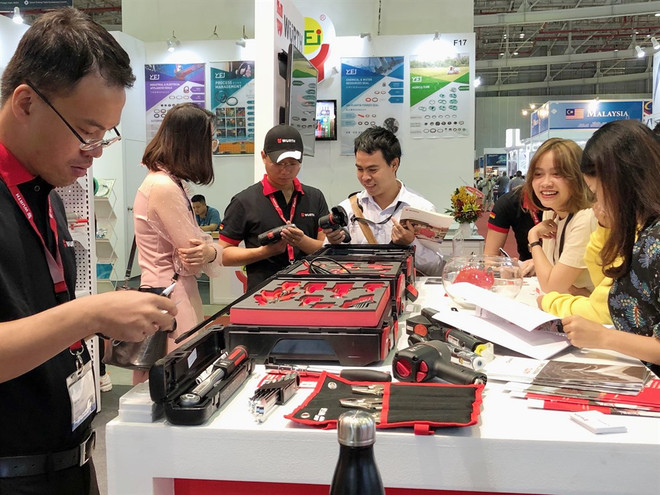 A booth at the Automechanika HCM City Expo, a regional trade fair for the automotive service industry that is open in HCM City from February 28 to March 2 (Source: VNA)
A booth at the Automechanika HCM City Expo, a regional trade fair for the automotive service industry that is open in HCM City from February 28 to March 2 (Source: VNA)HCMCity (VNA) - The Vietnamese automobile industry is expected togrow well, driven mainly by an increase in per capita income, demand for cars,and infrastructure improvement.
Speaking at a recent seminar on auto industry,held during the Automechanika HCM City expo, Nguyen Thanh Dam, Chairman of Vast Group JSC,said that production reached 215,000 autos last year, which was modest comparedto other countries in the region.
This accounted for just 0.2percent of the number of vehicles produced globally.
More than 352,200 unitswere bought in Vietnam last year, ranking fourth in the ASEAN region after Indonesia (1.1million units), Thailand (950,000 units), and Malaysia (560,000).
The average number of carsper 1,000 people in Vietnam was still low (at 23 cars per 1,000 people) comparedto other countries, Dam said.
With an increase in income,a “golden demographic” with the number of people having good earnings nowaccounting for 52 per cent of the population, demand for cars among youngfamilies and car consumption is expected to increase strongly.
“There will be fiercecompetition among large automobile companies this year,” he said, adding thatcarmakers would launch many new models to expand their market share.
The automobile market isexpected to grow by 10 percent this year, he said.
But the underdevelopment ofthe supporting industry, the low localisation ratio and tax policies that resultin high car prices have affected the development of the automobile industry.
To make a car, between30,000 and 40,000 accessories and parts are needed, but in Vietnam more than 90 percent ofthese accessories and parts are supplied by parent companies or other foreigncompanies, they said.
According to the Ministryof Industry and Trade, Vietnam has 358 businesses involved in automobile production,including 50 automobile assemblers and 214 accessories makers.
Local companies haveproduced simple accessories, such as a body shell, cabin shell, gear boxes, carseat, and brakes, with low technology content and value addition.
Acknowledging thesituation, the Government has devised policies to boost the development of thelocal supporting industry to increase localisation rates as well as enable morelocal enterprises to participate in the automobile production chain, delegatessaid.
In addition, trade fairswill offer opportunities for local firms to learn about the latest accessoriesand parts as well as new car models, and explore cooperation opportunities withforeign partners, they added.-VNA




























